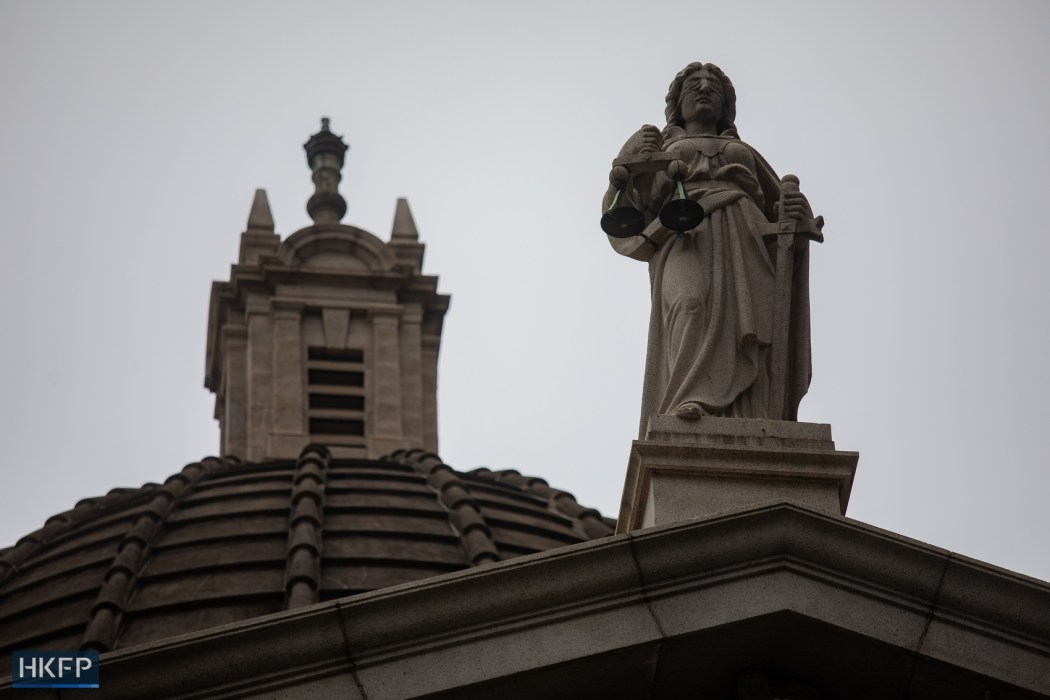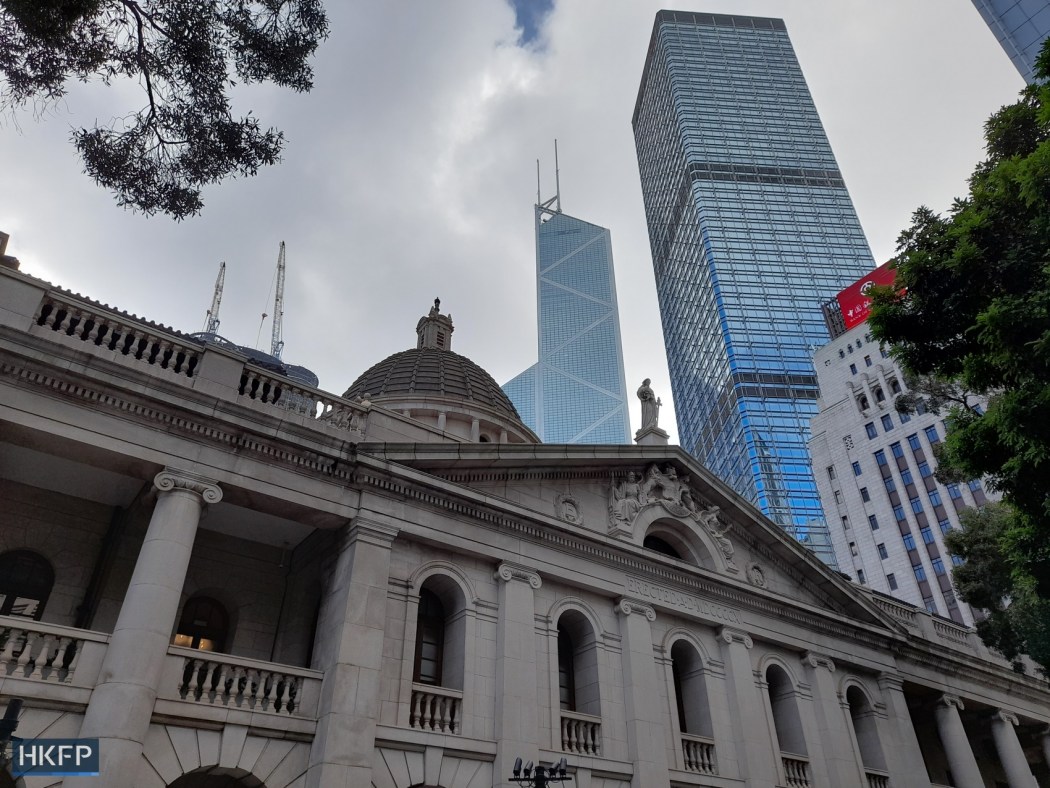Chief Executive John Lee has hit back at a former top court judge who said Hong Kong was “slowly becoming a totalitarian state” in an op-ed explaining his reasons for quitting the city’s Court of Final Appeal, saying that judges’ expertise lay in the law, not politics.

At a routine press briefing on Tuesday, Lee responded to questions from reporters about the resignation of Lord Jonathan Sumption. In a Financial Times opinion piece published on Monday, Sumption said judges in the city were having to operate in an “almost impossible political environment created by China” and that the city’s atmosphere was “oppressive.”
Lee said the duty of a judge was to interpret the law in accordance with legal principles and evidence, “whether he likes that law or not, not from his political stance.”
“A judge is entitled to his personal political preferences. But that is not a judge’s area of professional expertise,” Lee said in response to a question from HKFP.
Sumption was among three judges in recent days to announce their departure from the Court of Final Appeal, in addition to Lord Lawrence Collins and Beverley McLachlin. Collins said he had resigned “because of the political situation” but that he still had the “fullest confidence in the court.” McLachlin, whose three-year term will end on July 29, did not mention politics and said she continued to have “confidence in the members of the Court, their independence, and their determination to uphold the rule of law.”

Responding to HKFP’s question about Sumption, Lee said his recent op-ed was “contradictory” to his words in the past, referring to an opinion piece Sumption wrote for British newspaper The Times three years ago.
The chief executive said Sumption had then refused to take part in a “political boycott” orchestrated by some UK lawmakers and legal professionals, citing Sumption as saying that although Hong Kong did not have democracy while under colonial rule, its rule of law was maintained by judges.
“His latest statement indicates that he doesn’t like the political situation in Hong Kong,” Lee said. “But this is exactly the area he told us in 2021 that should not be confused with the rule of law.”
The presence of international judges has historically given credibility to Hong Kong’s common law legal tradition. Sumption has served on the city’s top court since 2019, and was involved in a case surrounding the definition of rioting following the protests and unrest that year.

In his Financial Times op-ed, Sumption wrote: ”I remained on the court in the hope that the presence of overseas judges would help sustain the rule of law. I fear that this is no longer realistic.”
Sumption’s latest three-year term as an overseas non-permanent judge on the Court of Final Appeal was due to expire in December 2025.
No political pressure, gov’t says
Lee’s comments came after the government released a 2,800-word statement in the early hours of Tuesday saying that there was “absolutely no truth” that the courts faced political pressure from Beijing or Hong Kong authorities.
The statement cited Sumption’s comments on the verdict of the landmark national security trial relating to 47 democrats charged with conspiring to commit subversion over a legislative primary. Of the 16 people who pleaded not guilty, 14 were convicted, with the handpicked national security judges siding with the prosecution who said they intended to indiscriminately veto the budget if elected to the legislature and ultimately force a government shutdown.

Sumption wrote in his op-ed that the Basic Law authorises lawmakers to reject the budget, and that if done twice, the chief executive’s resignation would be triggered. The judges’ verdict showed that the Legislative Council “cannot exercise an express constitutional right for a purpose unwelcome to the government,” he wrote.
In response, the authorities said in its statement that indiscriminate vetoing of the budget to compel authorities to “accede to political demands” and force the leader’s resignation amounted to an abuse of powers and was hence unlawful.
The statement also disputed Sumption’s comments that Hong Kong already had laws to deal with the protests and unrest in 2019, saying that “any responsible government” would have taken decisive action to “curb the insurrection and violence” seen that year.

“Lord Sumption’s claim that the ordinary laws of Hong Kong were perfectly adequate for dealing with the riots is in total disregard of the actual situation of the insurrection,” the authorities wrote.
There was also “no truth” in Sumption’s comments that Hong Kong was becoming a “totalitarian” city, the statement added, citing the city’s “mega events” and an increase in overseas enterprises entering Hong Kong last year.
Beijing inserted national security legislation directly into Hong Kong’s mini-constitution in June 2020 following a year of pro-democracy protests and unrest. It criminalised subversion, secession, collusion with foreign forces and terrorist acts – broadly defined to include disruption to transport and other infrastructure. The move gave police sweeping new powers and led to hundreds of arrests amid new legal precedents, while dozens of civil society groups disappeared. The authorities say it restored stability and peace to the city, rejecting criticism from trade partners, the UN and NGOs.

In a statement published around Tuesday noon, Chief Justice Andrew Cheung, who is the president of the Court of Final Appeal, said suggestions any judge had been “influenced by extraneous considerations, political or otherwise, is a serious allegation that must be duly substantiated and should not be lightly made.”
Cheung said it was sometimes hard to strike a balance between protecting rights and safeguarding national security. He added: “It is one thing to disagree with a court’s decision, but it is quite another to suggest that fundamental rights have been compromised because of political concerns.”
Also commenting on Sumption’s opinion piece, the Hong Kong Bar Association said on Tuesday that it had “every confidence” in Hong Kong’s judiciary and urged the public to support judges’ work.
The group added that judges can only decide cases on the basis of the legal arguments and evidence presented to them.
Corrections:
11/6/2024 at 11.03pm: An earlier version of this article quoted Sumption as saying Hong Kong was slowly becoming an authoritarian state. He had said totalitarian state. We regret the error.
Support HKFP | Policies & Ethics | Error/typo? | Contact Us | Newsletter | Transparency & Annual Report | Apps
Help safeguard press freedom & keep HKFP free for all readers by supporting our team

LATEST FROM HKFP
HKFP has an impartial stance, transparent funding, and balanced coverage guided by an Ethics Code and Corrections Policy.
Support press freedom & help us surpass 1,000 monthly Patrons: 100% independent, governed by an ethics code & not-for-profit.









